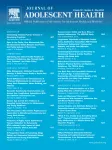| Titre : | Adolescent hazardous drinking and socioeconomic status in France: Insights into the alcohol harm paradox (2024) |
| Auteurs : | S. LEGLEYE ; M. KHLAT ; H. J. AUBIN ; D. BRICARD |
| Type de document : | Article : Périodique |
| Dans : | Journal of Adolescent Health (Vol.74, n°3, March 2024) |
| Article en page(s) : | 458-465 |
| Langues: | Anglais |
| Discipline : | EPI (Epidémiologie / Epidemiology) |
| Mots-clés : |
Thésaurus géographique FRANCEThésaurus mots-clés ADOLESCENT ; ALCOOL ; ESCAPAD ; ETUDE TRANSVERSALE ; USAGE PROBLEMATIQUE ; CATEGORIE SOCIO-PROFESSIONNELLE ; TYPE D'USAGE ; ABUS ; FAMILLE ; PARENT ; PREVALENCE |
| Résumé : |
Purpose: The "alcohol harm paradox" has been evidenced among adults, but it is still largely unexplored among adolescents. We examined in a sample of French adolescents the relation between family socioeconomic status (SES), family living arrangement and parental substance use on 1 hand, and heavy episodic drinking (HED), lifetime alcohol-induced emergency room visits (A-ERV), and number of alcoholic drinks and solitary drinking during the last episode on the other hand.
Methods: A cross-sectional nationwide survey in March 2017 involved 13,314 French adolescents aged 17-18.5 years. They completed a pen and paper questionnaire about their own and their parents' alcohol and tobacco consumption. We used risk ratios (RRs) from modified Poisson regressions to assess the relationships. Results: Adolescents from the lowest SES had reduced likelihood of reporting 1-2 or 3-5 episodes of heavy drinking compared to those from the highest SES (RR = 0.58, 95% confidence interval = [0.50; 0.66] and 0.35 [0.27; 0.45]), but no difference for six or more episodes (RR = 0.81 [0.59; 1.12]). A-ERV was more frequent among lowest SES adolescents (RR = 1.86 [1.05; 3.30]), possibly due to drinking larger quantities of alcohol and to more frequent solitary drinking in their last episode (p < .001). SES, parental substance use, and family living arrangement were independently associated with HED. Discussion: Our findings reveal an "alcohol harm paradox" in late adolescence in France. Lower SES adolescents exhibit reduced HED but were more likely to consume large quantities alone and experience A-ERV. This emphasizes the significance of considering social determinants in alcohol-related research and interventions. |
| Domaine : | Alcool / Alcohol |
| Refs biblio. : | 47 |
| Affiliation : |
Université Paris-Saclay, Inserm, CESP, Villejuif, France Centre de Recherche en Économie et Statistique (CREST), Rennes, France Institut national d’études démographiques (INED), Aubervilliers, France AP-HP, Université Paris Saclay, Villejuif, France Institut de recherche et documentation en économie de la santé (Irdes), Paris, France |
| Lien : | https://doi.org/10.1016/j.jadohealth.2023.10.008 |
 Accueil
Accueil



